Challenges Faced by OFWs Amidst COVID-19: A Review of Related Literature
VerifiedAdded on 2023/06/12
|8
|2880
|220
AI Summary
This article reviews the challenges faced by Overseas Filipino Workers (OFWs) amidst COVID-19 pandemic. It covers the impact of COVID-19 on OFWs, their mental health, and the challenges they face in their work and personal lives. The article also evaluates the current state of the art and issues that are important for future study.
Contribute Materials
Your contribution can guide someone’s learning journey. Share your
documents today.
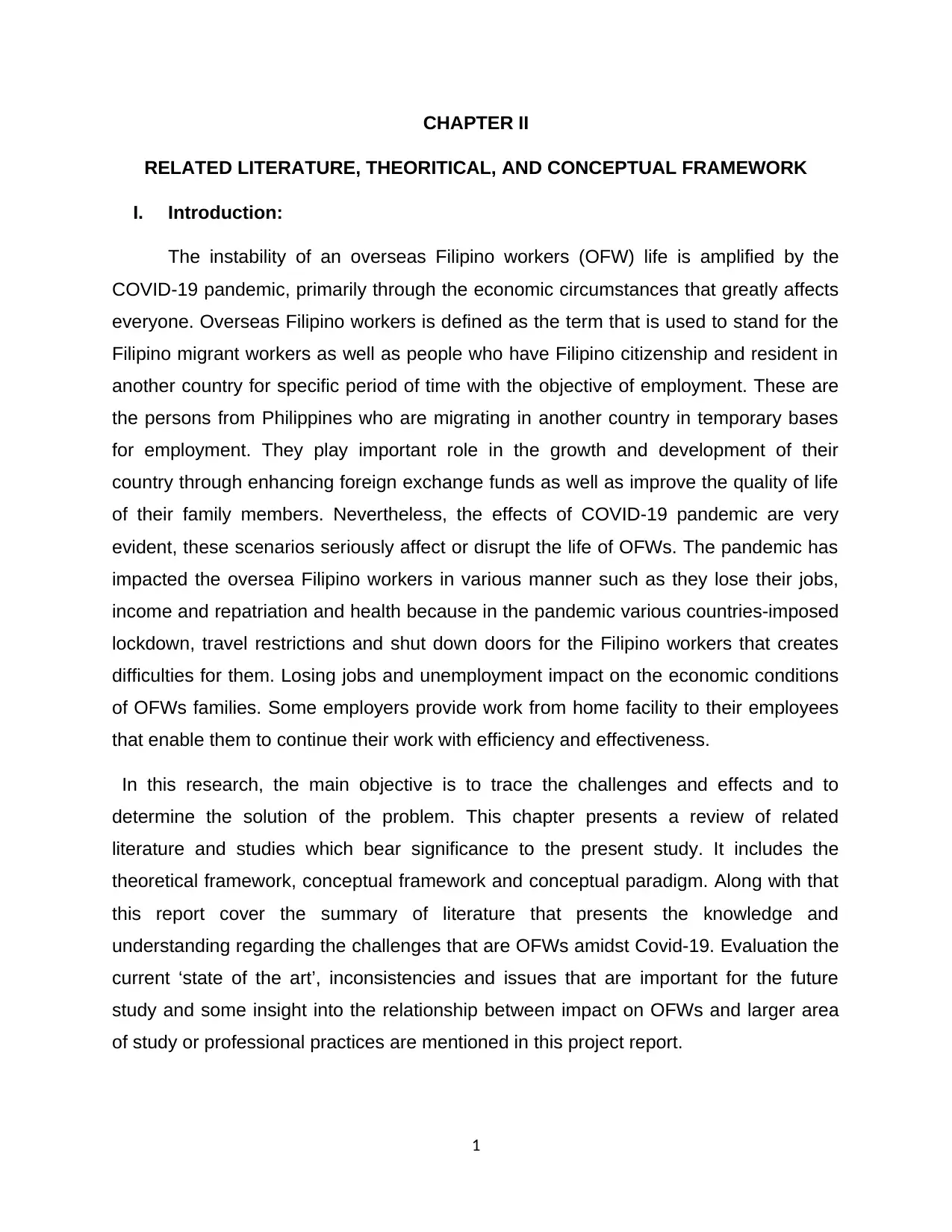
CHAPTER II
RELATED LITERATURE, THEORITICAL, AND CONCEPTUAL FRAMEWORK
I. Introduction:
The instability of an overseas Filipino workers (OFW) life is amplified by the
COVID-19 pandemic, primarily through the economic circumstances that greatly affects
everyone. Overseas Filipino workers is defined as the term that is used to stand for the
Filipino migrant workers as well as people who have Filipino citizenship and resident in
another country for specific period of time with the objective of employment. These are
the persons from Philippines who are migrating in another country in temporary bases
for employment. They play important role in the growth and development of their
country through enhancing foreign exchange funds as well as improve the quality of life
of their family members. Nevertheless, the effects of COVID-19 pandemic are very
evident, these scenarios seriously affect or disrupt the life of OFWs. The pandemic has
impacted the oversea Filipino workers in various manner such as they lose their jobs,
income and repatriation and health because in the pandemic various countries-imposed
lockdown, travel restrictions and shut down doors for the Filipino workers that creates
difficulties for them. Losing jobs and unemployment impact on the economic conditions
of OFWs families. Some employers provide work from home facility to their employees
that enable them to continue their work with efficiency and effectiveness.
In this research, the main objective is to trace the challenges and effects and to
determine the solution of the problem. This chapter presents a review of related
literature and studies which bear significance to the present study. It includes the
theoretical framework, conceptual framework and conceptual paradigm. Along with that
this report cover the summary of literature that presents the knowledge and
understanding regarding the challenges that are OFWs amidst Covid-19. Evaluation the
current ‘state of the art’, inconsistencies and issues that are important for the future
study and some insight into the relationship between impact on OFWs and larger area
of study or professional practices are mentioned in this project report.
1
RELATED LITERATURE, THEORITICAL, AND CONCEPTUAL FRAMEWORK
I. Introduction:
The instability of an overseas Filipino workers (OFW) life is amplified by the
COVID-19 pandemic, primarily through the economic circumstances that greatly affects
everyone. Overseas Filipino workers is defined as the term that is used to stand for the
Filipino migrant workers as well as people who have Filipino citizenship and resident in
another country for specific period of time with the objective of employment. These are
the persons from Philippines who are migrating in another country in temporary bases
for employment. They play important role in the growth and development of their
country through enhancing foreign exchange funds as well as improve the quality of life
of their family members. Nevertheless, the effects of COVID-19 pandemic are very
evident, these scenarios seriously affect or disrupt the life of OFWs. The pandemic has
impacted the oversea Filipino workers in various manner such as they lose their jobs,
income and repatriation and health because in the pandemic various countries-imposed
lockdown, travel restrictions and shut down doors for the Filipino workers that creates
difficulties for them. Losing jobs and unemployment impact on the economic conditions
of OFWs families. Some employers provide work from home facility to their employees
that enable them to continue their work with efficiency and effectiveness.
In this research, the main objective is to trace the challenges and effects and to
determine the solution of the problem. This chapter presents a review of related
literature and studies which bear significance to the present study. It includes the
theoretical framework, conceptual framework and conceptual paradigm. Along with that
this report cover the summary of literature that presents the knowledge and
understanding regarding the challenges that are OFWs amidst Covid-19. Evaluation the
current ‘state of the art’, inconsistencies and issues that are important for the future
study and some insight into the relationship between impact on OFWs and larger area
of study or professional practices are mentioned in this project report.
1
Secure Best Marks with AI Grader
Need help grading? Try our AI Grader for instant feedback on your assignments.
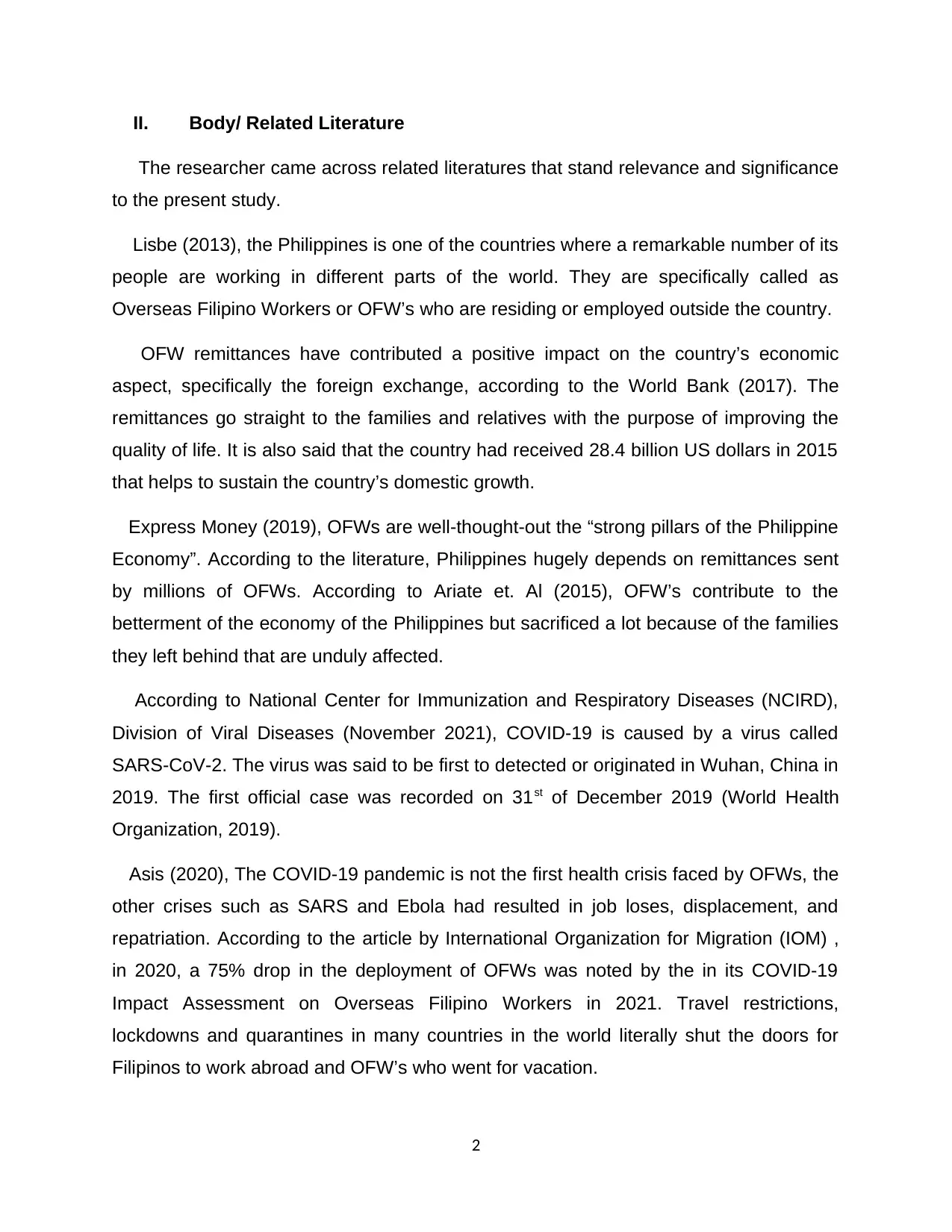
II. Body/ Related Literature
The researcher came across related literatures that stand relevance and significance
to the present study.
Lisbe (2013), the Philippines is one of the countries where a remarkable number of its
people are working in different parts of the world. They are specifically called as
Overseas Filipino Workers or OFW’s who are residing or employed outside the country.
OFW remittances have contributed a positive impact on the country’s economic
aspect, specifically the foreign exchange, according to the World Bank (2017). The
remittances go straight to the families and relatives with the purpose of improving the
quality of life. It is also said that the country had received 28.4 billion US dollars in 2015
that helps to sustain the country’s domestic growth.
Express Money (2019), OFWs are well-thought-out the “strong pillars of the Philippine
Economy”. According to the literature, Philippines hugely depends on remittances sent
by millions of OFWs. According to Ariate et. Al (2015), OFW’s contribute to the
betterment of the economy of the Philippines but sacrificed a lot because of the families
they left behind that are unduly affected.
According to National Center for Immunization and Respiratory Diseases (NCIRD),
Division of Viral Diseases (November 2021), COVID-19 is caused by a virus called
SARS-CoV-2. The virus was said to be first to detected or originated in Wuhan, China in
2019. The first official case was recorded on 31st of December 2019 (World Health
Organization, 2019).
Asis (2020), The COVID-19 pandemic is not the first health crisis faced by OFWs, the
other crises such as SARS and Ebola had resulted in job loses, displacement, and
repatriation. According to the article by International Organization for Migration (IOM) ,
in 2020, a 75% drop in the deployment of OFWs was noted by the in its COVID-19
Impact Assessment on Overseas Filipino Workers in 2021. Travel restrictions,
lockdowns and quarantines in many countries in the world literally shut the doors for
Filipinos to work abroad and OFW’s who went for vacation.
2
The researcher came across related literatures that stand relevance and significance
to the present study.
Lisbe (2013), the Philippines is one of the countries where a remarkable number of its
people are working in different parts of the world. They are specifically called as
Overseas Filipino Workers or OFW’s who are residing or employed outside the country.
OFW remittances have contributed a positive impact on the country’s economic
aspect, specifically the foreign exchange, according to the World Bank (2017). The
remittances go straight to the families and relatives with the purpose of improving the
quality of life. It is also said that the country had received 28.4 billion US dollars in 2015
that helps to sustain the country’s domestic growth.
Express Money (2019), OFWs are well-thought-out the “strong pillars of the Philippine
Economy”. According to the literature, Philippines hugely depends on remittances sent
by millions of OFWs. According to Ariate et. Al (2015), OFW’s contribute to the
betterment of the economy of the Philippines but sacrificed a lot because of the families
they left behind that are unduly affected.
According to National Center for Immunization and Respiratory Diseases (NCIRD),
Division of Viral Diseases (November 2021), COVID-19 is caused by a virus called
SARS-CoV-2. The virus was said to be first to detected or originated in Wuhan, China in
2019. The first official case was recorded on 31st of December 2019 (World Health
Organization, 2019).
Asis (2020), The COVID-19 pandemic is not the first health crisis faced by OFWs, the
other crises such as SARS and Ebola had resulted in job loses, displacement, and
repatriation. According to the article by International Organization for Migration (IOM) ,
in 2020, a 75% drop in the deployment of OFWs was noted by the in its COVID-19
Impact Assessment on Overseas Filipino Workers in 2021. Travel restrictions,
lockdowns and quarantines in many countries in the world literally shut the doors for
Filipinos to work abroad and OFW’s who went for vacation.
2
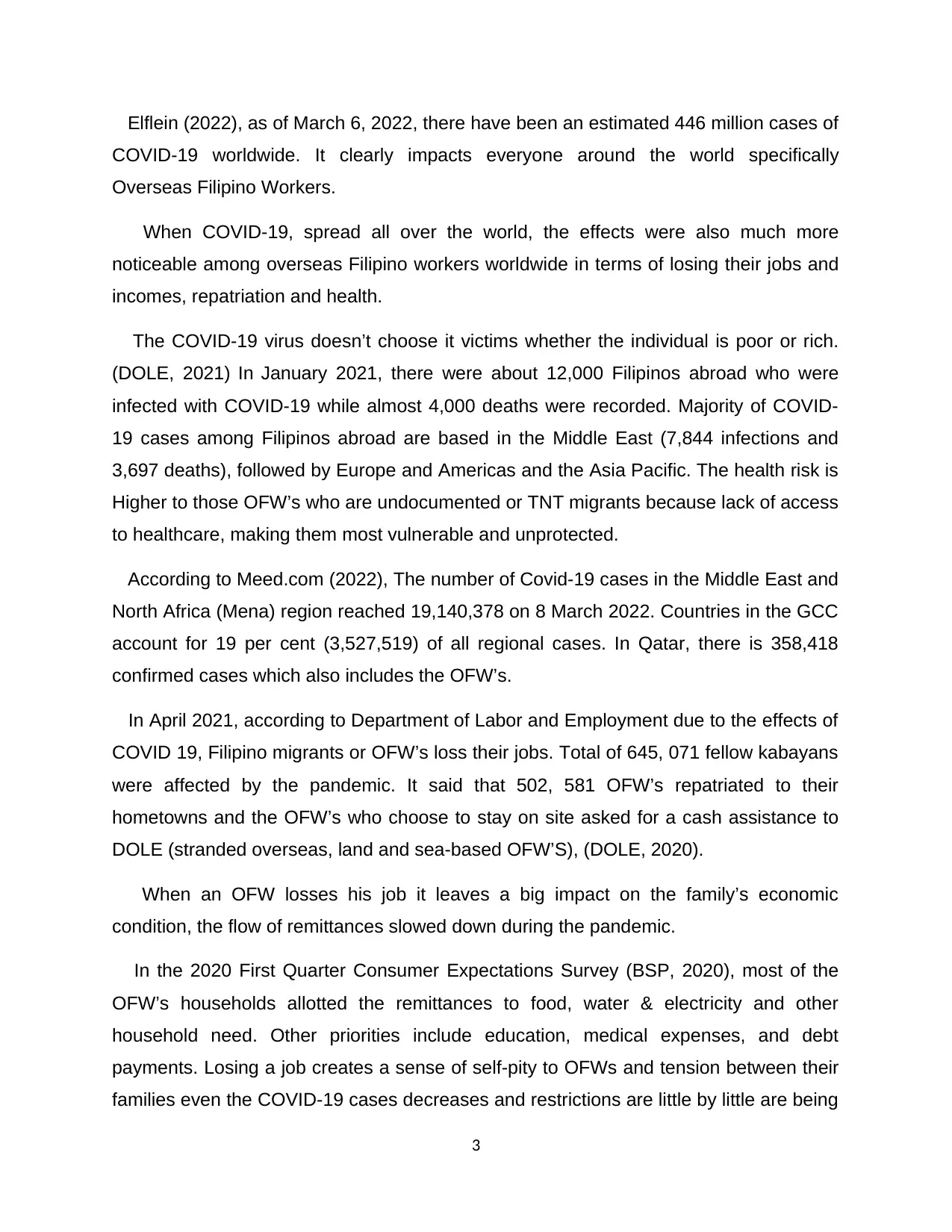
Elflein (2022), as of March 6, 2022, there have been an estimated 446 million cases of
COVID-19 worldwide. It clearly impacts everyone around the world specifically
Overseas Filipino Workers.
When COVID-19, spread all over the world, the effects were also much more
noticeable among overseas Filipino workers worldwide in terms of losing their jobs and
incomes, repatriation and health.
The COVID-19 virus doesn’t choose it victims whether the individual is poor or rich.
(DOLE, 2021) In January 2021, there were about 12,000 Filipinos abroad who were
infected with COVID-19 while almost 4,000 deaths were recorded. Majority of COVID-
19 cases among Filipinos abroad are based in the Middle East (7,844 infections and
3,697 deaths), followed by Europe and Americas and the Asia Pacific. The health risk is
Higher to those OFW’s who are undocumented or TNT migrants because lack of access
to healthcare, making them most vulnerable and unprotected.
According to Meed.com (2022), The number of Covid-19 cases in the Middle East and
North Africa (Mena) region reached 19,140,378 on 8 March 2022. Countries in the GCC
account for 19 per cent (3,527,519) of all regional cases. In Qatar, there is 358,418
confirmed cases which also includes the OFW’s.
In April 2021, according to Department of Labor and Employment due to the effects of
COVID 19, Filipino migrants or OFW’s loss their jobs. Total of 645, 071 fellow kabayans
were affected by the pandemic. It said that 502, 581 OFW’s repatriated to their
hometowns and the OFW’s who choose to stay on site asked for a cash assistance to
DOLE (stranded overseas, land and sea-based OFW’S), (DOLE, 2020).
When an OFW losses his job it leaves a big impact on the family’s economic
condition, the flow of remittances slowed down during the pandemic.
In the 2020 First Quarter Consumer Expectations Survey (BSP, 2020), most of the
OFW’s households allotted the remittances to food, water & electricity and other
household need. Other priorities include education, medical expenses, and debt
payments. Losing a job creates a sense of self-pity to OFWs and tension between their
families even the COVID-19 cases decreases and restrictions are little by little are being
3
COVID-19 worldwide. It clearly impacts everyone around the world specifically
Overseas Filipino Workers.
When COVID-19, spread all over the world, the effects were also much more
noticeable among overseas Filipino workers worldwide in terms of losing their jobs and
incomes, repatriation and health.
The COVID-19 virus doesn’t choose it victims whether the individual is poor or rich.
(DOLE, 2021) In January 2021, there were about 12,000 Filipinos abroad who were
infected with COVID-19 while almost 4,000 deaths were recorded. Majority of COVID-
19 cases among Filipinos abroad are based in the Middle East (7,844 infections and
3,697 deaths), followed by Europe and Americas and the Asia Pacific. The health risk is
Higher to those OFW’s who are undocumented or TNT migrants because lack of access
to healthcare, making them most vulnerable and unprotected.
According to Meed.com (2022), The number of Covid-19 cases in the Middle East and
North Africa (Mena) region reached 19,140,378 on 8 March 2022. Countries in the GCC
account for 19 per cent (3,527,519) of all regional cases. In Qatar, there is 358,418
confirmed cases which also includes the OFW’s.
In April 2021, according to Department of Labor and Employment due to the effects of
COVID 19, Filipino migrants or OFW’s loss their jobs. Total of 645, 071 fellow kabayans
were affected by the pandemic. It said that 502, 581 OFW’s repatriated to their
hometowns and the OFW’s who choose to stay on site asked for a cash assistance to
DOLE (stranded overseas, land and sea-based OFW’S), (DOLE, 2020).
When an OFW losses his job it leaves a big impact on the family’s economic
condition, the flow of remittances slowed down during the pandemic.
In the 2020 First Quarter Consumer Expectations Survey (BSP, 2020), most of the
OFW’s households allotted the remittances to food, water & electricity and other
household need. Other priorities include education, medical expenses, and debt
payments. Losing a job creates a sense of self-pity to OFWs and tension between their
families even the COVID-19 cases decreases and restrictions are little by little are being
3
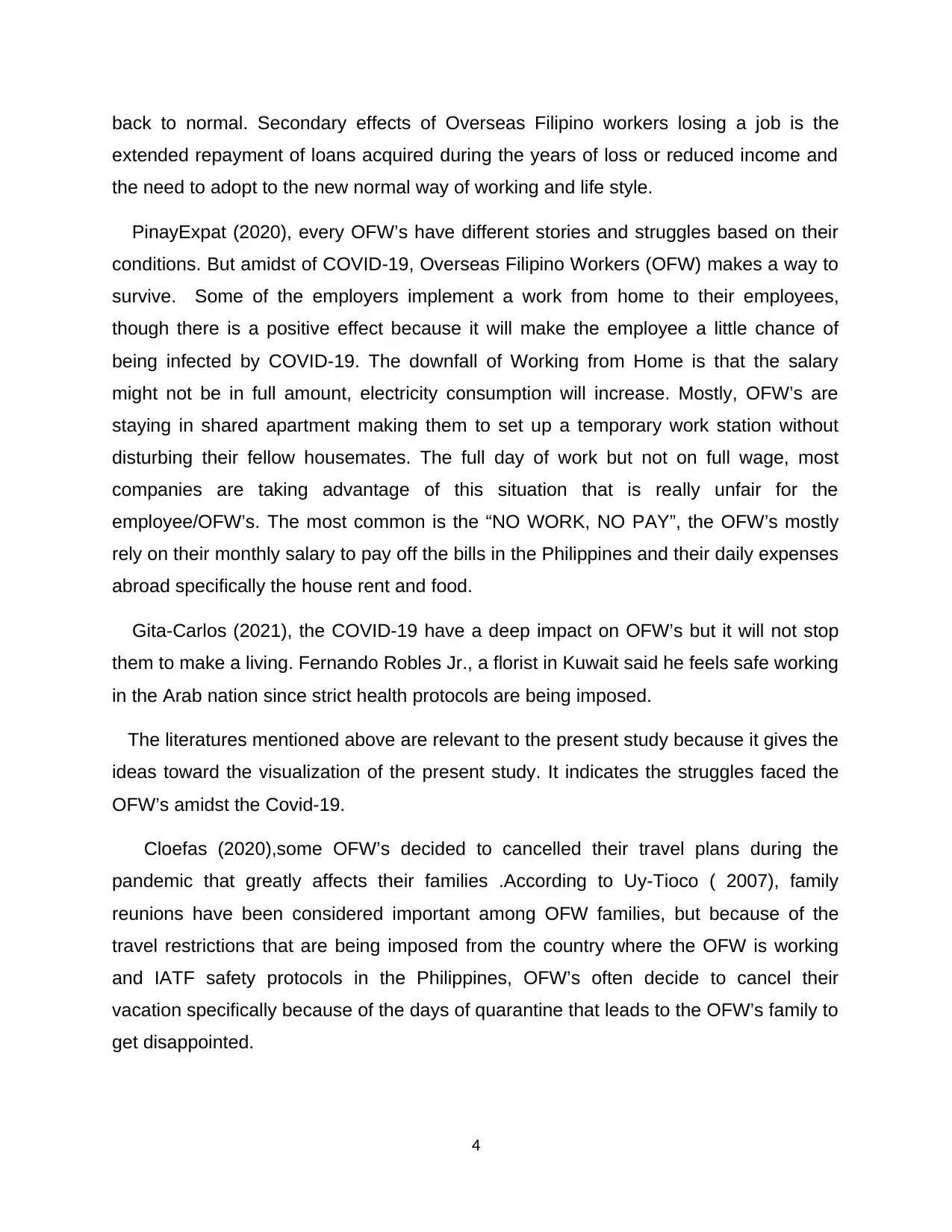
back to normal. Secondary effects of Overseas Filipino workers losing a job is the
extended repayment of loans acquired during the years of loss or reduced income and
the need to adopt to the new normal way of working and life style.
PinayExpat (2020), every OFW’s have different stories and struggles based on their
conditions. But amidst of COVID-19, Overseas Filipino Workers (OFW) makes a way to
survive. Some of the employers implement a work from home to their employees,
though there is a positive effect because it will make the employee a little chance of
being infected by COVID-19. The downfall of Working from Home is that the salary
might not be in full amount, electricity consumption will increase. Mostly, OFW’s are
staying in shared apartment making them to set up a temporary work station without
disturbing their fellow housemates. The full day of work but not on full wage, most
companies are taking advantage of this situation that is really unfair for the
employee/OFW’s. The most common is the “NO WORK, NO PAY”, the OFW’s mostly
rely on their monthly salary to pay off the bills in the Philippines and their daily expenses
abroad specifically the house rent and food.
Gita-Carlos (2021), the COVID-19 have a deep impact on OFW’s but it will not stop
them to make a living. Fernando Robles Jr., a florist in Kuwait said he feels safe working
in the Arab nation since strict health protocols are being imposed.
The literatures mentioned above are relevant to the present study because it gives the
ideas toward the visualization of the present study. It indicates the struggles faced the
OFW’s amidst the Covid-19.
Cloefas (2020),some OFW’s decided to cancelled their travel plans during the
pandemic that greatly affects their families .According to Uy-Tioco ( 2007), family
reunions have been considered important among OFW families, but because of the
travel restrictions that are being imposed from the country where the OFW is working
and IATF safety protocols in the Philippines, OFW’s often decide to cancel their
vacation specifically because of the days of quarantine that leads to the OFW’s family to
get disappointed.
4
extended repayment of loans acquired during the years of loss or reduced income and
the need to adopt to the new normal way of working and life style.
PinayExpat (2020), every OFW’s have different stories and struggles based on their
conditions. But amidst of COVID-19, Overseas Filipino Workers (OFW) makes a way to
survive. Some of the employers implement a work from home to their employees,
though there is a positive effect because it will make the employee a little chance of
being infected by COVID-19. The downfall of Working from Home is that the salary
might not be in full amount, electricity consumption will increase. Mostly, OFW’s are
staying in shared apartment making them to set up a temporary work station without
disturbing their fellow housemates. The full day of work but not on full wage, most
companies are taking advantage of this situation that is really unfair for the
employee/OFW’s. The most common is the “NO WORK, NO PAY”, the OFW’s mostly
rely on their monthly salary to pay off the bills in the Philippines and their daily expenses
abroad specifically the house rent and food.
Gita-Carlos (2021), the COVID-19 have a deep impact on OFW’s but it will not stop
them to make a living. Fernando Robles Jr., a florist in Kuwait said he feels safe working
in the Arab nation since strict health protocols are being imposed.
The literatures mentioned above are relevant to the present study because it gives the
ideas toward the visualization of the present study. It indicates the struggles faced the
OFW’s amidst the Covid-19.
Cloefas (2020),some OFW’s decided to cancelled their travel plans during the
pandemic that greatly affects their families .According to Uy-Tioco ( 2007), family
reunions have been considered important among OFW families, but because of the
travel restrictions that are being imposed from the country where the OFW is working
and IATF safety protocols in the Philippines, OFW’s often decide to cancel their
vacation specifically because of the days of quarantine that leads to the OFW’s family to
get disappointed.
4
Secure Best Marks with AI Grader
Need help grading? Try our AI Grader for instant feedback on your assignments.
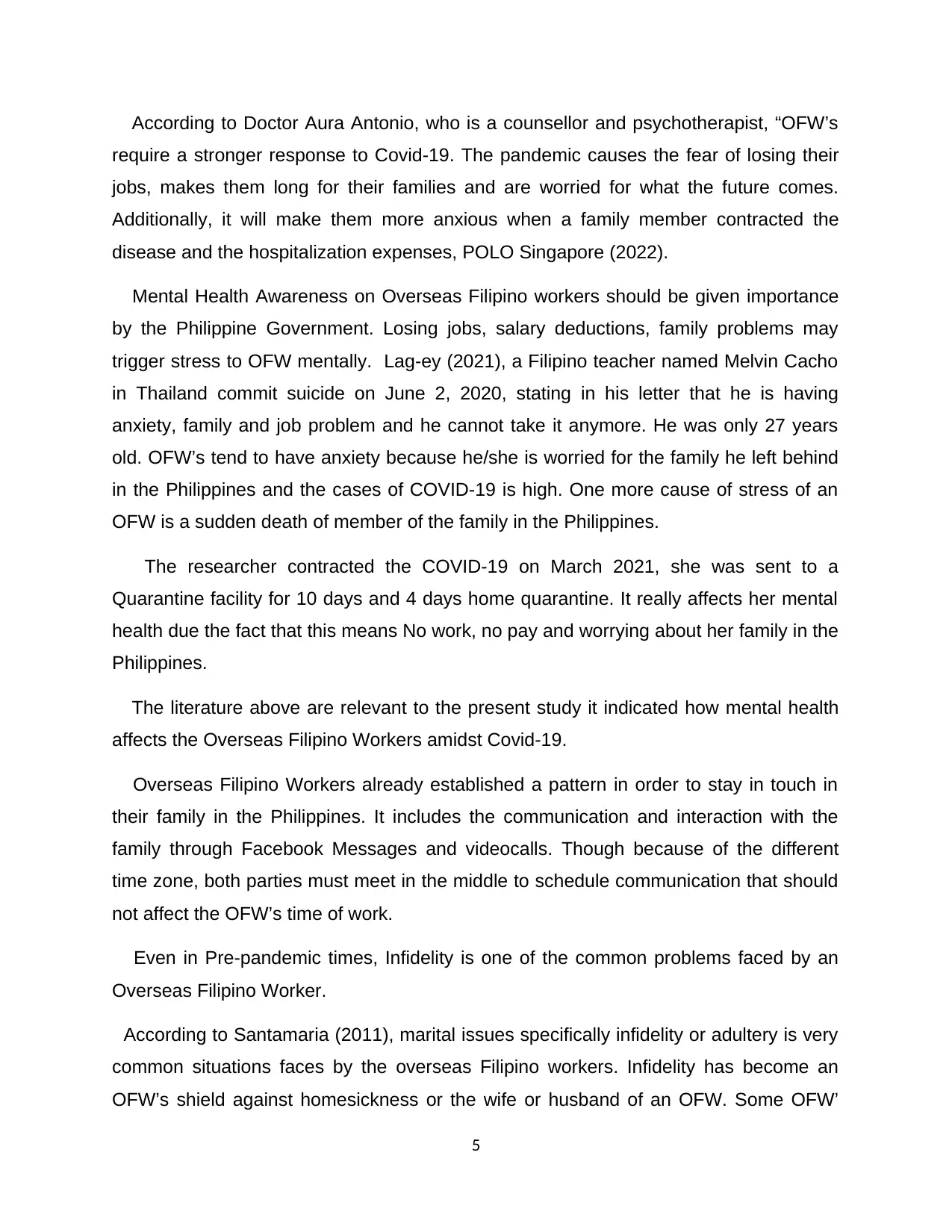
According to Doctor Aura Antonio, who is a counsellor and psychotherapist, “OFW’s
require a stronger response to Covid-19. The pandemic causes the fear of losing their
jobs, makes them long for their families and are worried for what the future comes.
Additionally, it will make them more anxious when a family member contracted the
disease and the hospitalization expenses, POLO Singapore (2022).
Mental Health Awareness on Overseas Filipino workers should be given importance
by the Philippine Government. Losing jobs, salary deductions, family problems may
trigger stress to OFW mentally. Lag-ey (2021), a Filipino teacher named Melvin Cacho
in Thailand commit suicide on June 2, 2020, stating in his letter that he is having
anxiety, family and job problem and he cannot take it anymore. He was only 27 years
old. OFW’s tend to have anxiety because he/she is worried for the family he left behind
in the Philippines and the cases of COVID-19 is high. One more cause of stress of an
OFW is a sudden death of member of the family in the Philippines.
The researcher contracted the COVID-19 on March 2021, she was sent to a
Quarantine facility for 10 days and 4 days home quarantine. It really affects her mental
health due the fact that this means No work, no pay and worrying about her family in the
Philippines.
The literature above are relevant to the present study it indicated how mental health
affects the Overseas Filipino Workers amidst Covid-19.
Overseas Filipino Workers already established a pattern in order to stay in touch in
their family in the Philippines. It includes the communication and interaction with the
family through Facebook Messages and videocalls. Though because of the different
time zone, both parties must meet in the middle to schedule communication that should
not affect the OFW’s time of work.
Even in Pre-pandemic times, Infidelity is one of the common problems faced by an
Overseas Filipino Worker.
According to Santamaria (2011), marital issues specifically infidelity or adultery is very
common situations faces by the overseas Filipino workers. Infidelity has become an
OFW’s shield against homesickness or the wife or husband of an OFW. Some OFW’
5
require a stronger response to Covid-19. The pandemic causes the fear of losing their
jobs, makes them long for their families and are worried for what the future comes.
Additionally, it will make them more anxious when a family member contracted the
disease and the hospitalization expenses, POLO Singapore (2022).
Mental Health Awareness on Overseas Filipino workers should be given importance
by the Philippine Government. Losing jobs, salary deductions, family problems may
trigger stress to OFW mentally. Lag-ey (2021), a Filipino teacher named Melvin Cacho
in Thailand commit suicide on June 2, 2020, stating in his letter that he is having
anxiety, family and job problem and he cannot take it anymore. He was only 27 years
old. OFW’s tend to have anxiety because he/she is worried for the family he left behind
in the Philippines and the cases of COVID-19 is high. One more cause of stress of an
OFW is a sudden death of member of the family in the Philippines.
The researcher contracted the COVID-19 on March 2021, she was sent to a
Quarantine facility for 10 days and 4 days home quarantine. It really affects her mental
health due the fact that this means No work, no pay and worrying about her family in the
Philippines.
The literature above are relevant to the present study it indicated how mental health
affects the Overseas Filipino Workers amidst Covid-19.
Overseas Filipino Workers already established a pattern in order to stay in touch in
their family in the Philippines. It includes the communication and interaction with the
family through Facebook Messages and videocalls. Though because of the different
time zone, both parties must meet in the middle to schedule communication that should
not affect the OFW’s time of work.
Even in Pre-pandemic times, Infidelity is one of the common problems faced by an
Overseas Filipino Worker.
According to Santamaria (2011), marital issues specifically infidelity or adultery is very
common situations faces by the overseas Filipino workers. Infidelity has become an
OFW’s shield against homesickness or the wife or husband of an OFW. Some OFW’
5
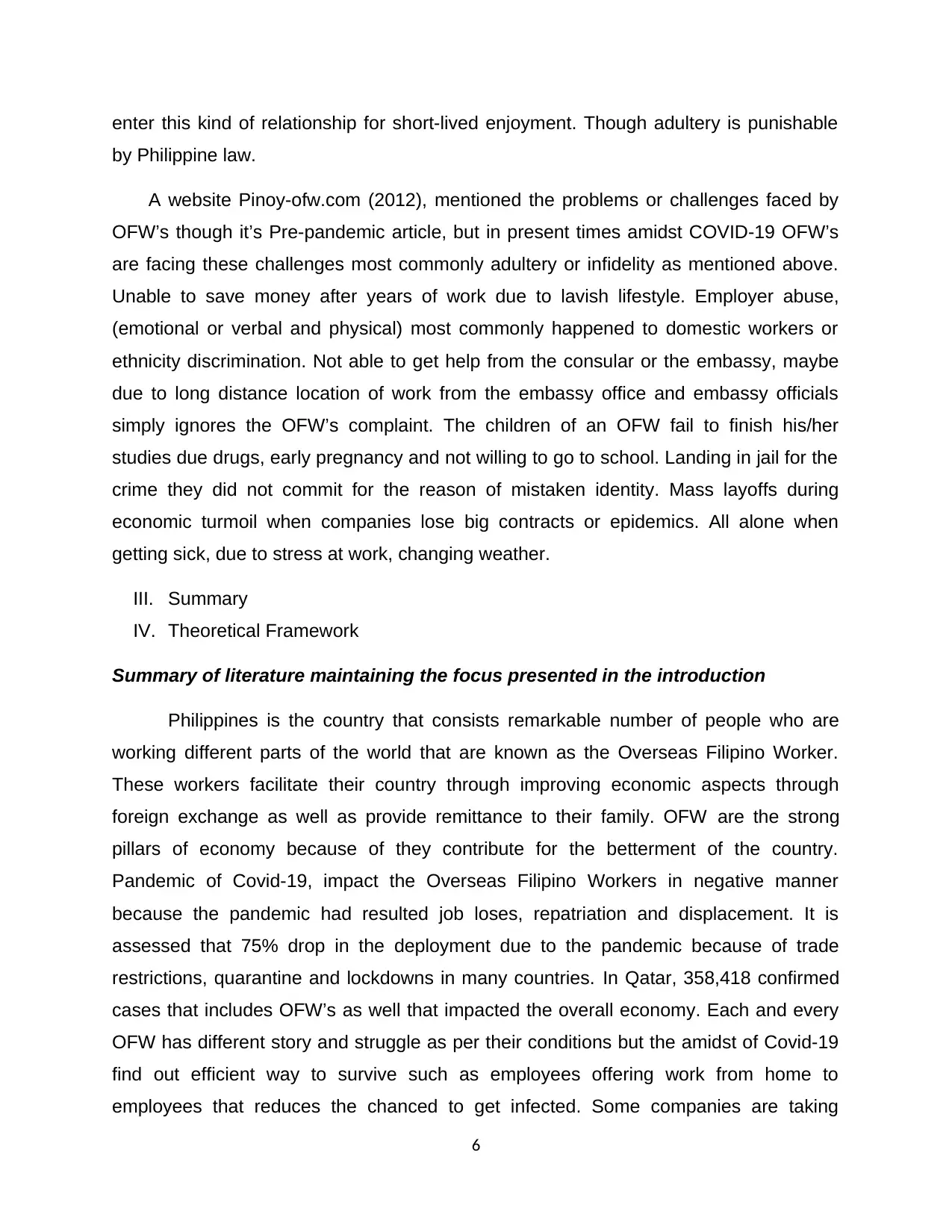
enter this kind of relationship for short-lived enjoyment. Though adultery is punishable
by Philippine law.
A website Pinoy-ofw.com (2012), mentioned the problems or challenges faced by
OFW’s though it’s Pre-pandemic article, but in present times amidst COVID-19 OFW’s
are facing these challenges most commonly adultery or infidelity as mentioned above.
Unable to save money after years of work due to lavish lifestyle. Employer abuse,
(emotional or verbal and physical) most commonly happened to domestic workers or
ethnicity discrimination. Not able to get help from the consular or the embassy, maybe
due to long distance location of work from the embassy office and embassy officials
simply ignores the OFW’s complaint. The children of an OFW fail to finish his/her
studies due drugs, early pregnancy and not willing to go to school. Landing in jail for the
crime they did not commit for the reason of mistaken identity. Mass layoffs during
economic turmoil when companies lose big contracts or epidemics. All alone when
getting sick, due to stress at work, changing weather.
III. Summary
IV. Theoretical Framework
Summary of literature maintaining the focus presented in the introduction
Philippines is the country that consists remarkable number of people who are
working different parts of the world that are known as the Overseas Filipino Worker.
These workers facilitate their country through improving economic aspects through
foreign exchange as well as provide remittance to their family. OFW are the strong
pillars of economy because of they contribute for the betterment of the country.
Pandemic of Covid-19, impact the Overseas Filipino Workers in negative manner
because the pandemic had resulted job loses, repatriation and displacement. It is
assessed that 75% drop in the deployment due to the pandemic because of trade
restrictions, quarantine and lockdowns in many countries. In Qatar, 358,418 confirmed
cases that includes OFW’s as well that impacted the overall economy. Each and every
OFW has different story and struggle as per their conditions but the amidst of Covid-19
find out efficient way to survive such as employees offering work from home to
employees that reduces the chanced to get infected. Some companies are taking
6
by Philippine law.
A website Pinoy-ofw.com (2012), mentioned the problems or challenges faced by
OFW’s though it’s Pre-pandemic article, but in present times amidst COVID-19 OFW’s
are facing these challenges most commonly adultery or infidelity as mentioned above.
Unable to save money after years of work due to lavish lifestyle. Employer abuse,
(emotional or verbal and physical) most commonly happened to domestic workers or
ethnicity discrimination. Not able to get help from the consular or the embassy, maybe
due to long distance location of work from the embassy office and embassy officials
simply ignores the OFW’s complaint. The children of an OFW fail to finish his/her
studies due drugs, early pregnancy and not willing to go to school. Landing in jail for the
crime they did not commit for the reason of mistaken identity. Mass layoffs during
economic turmoil when companies lose big contracts or epidemics. All alone when
getting sick, due to stress at work, changing weather.
III. Summary
IV. Theoretical Framework
Summary of literature maintaining the focus presented in the introduction
Philippines is the country that consists remarkable number of people who are
working different parts of the world that are known as the Overseas Filipino Worker.
These workers facilitate their country through improving economic aspects through
foreign exchange as well as provide remittance to their family. OFW are the strong
pillars of economy because of they contribute for the betterment of the country.
Pandemic of Covid-19, impact the Overseas Filipino Workers in negative manner
because the pandemic had resulted job loses, repatriation and displacement. It is
assessed that 75% drop in the deployment due to the pandemic because of trade
restrictions, quarantine and lockdowns in many countries. In Qatar, 358,418 confirmed
cases that includes OFW’s as well that impacted the overall economy. Each and every
OFW has different story and struggle as per their conditions but the amidst of Covid-19
find out efficient way to survive such as employees offering work from home to
employees that reduces the chanced to get infected. Some companies are taking
6
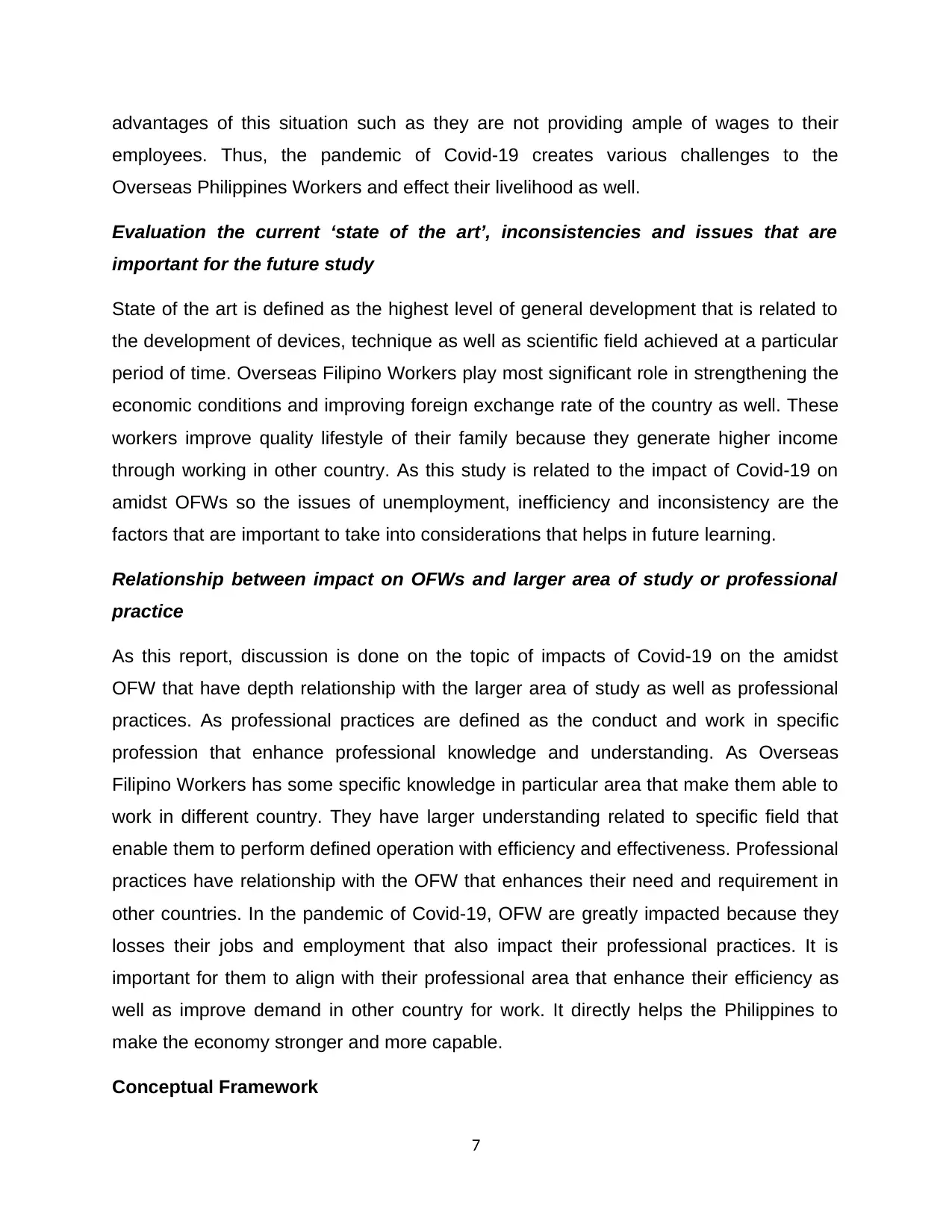
advantages of this situation such as they are not providing ample of wages to their
employees. Thus, the pandemic of Covid-19 creates various challenges to the
Overseas Philippines Workers and effect their livelihood as well.
Evaluation the current ‘state of the art’, inconsistencies and issues that are
important for the future study
State of the art is defined as the highest level of general development that is related to
the development of devices, technique as well as scientific field achieved at a particular
period of time. Overseas Filipino Workers play most significant role in strengthening the
economic conditions and improving foreign exchange rate of the country as well. These
workers improve quality lifestyle of their family because they generate higher income
through working in other country. As this study is related to the impact of Covid-19 on
amidst OFWs so the issues of unemployment, inefficiency and inconsistency are the
factors that are important to take into considerations that helps in future learning.
Relationship between impact on OFWs and larger area of study or professional
practice
As this report, discussion is done on the topic of impacts of Covid-19 on the amidst
OFW that have depth relationship with the larger area of study as well as professional
practices. As professional practices are defined as the conduct and work in specific
profession that enhance professional knowledge and understanding. As Overseas
Filipino Workers has some specific knowledge in particular area that make them able to
work in different country. They have larger understanding related to specific field that
enable them to perform defined operation with efficiency and effectiveness. Professional
practices have relationship with the OFW that enhances their need and requirement in
other countries. In the pandemic of Covid-19, OFW are greatly impacted because they
losses their jobs and employment that also impact their professional practices. It is
important for them to align with their professional area that enhance their efficiency as
well as improve demand in other country for work. It directly helps the Philippines to
make the economy stronger and more capable.
Conceptual Framework
7
employees. Thus, the pandemic of Covid-19 creates various challenges to the
Overseas Philippines Workers and effect their livelihood as well.
Evaluation the current ‘state of the art’, inconsistencies and issues that are
important for the future study
State of the art is defined as the highest level of general development that is related to
the development of devices, technique as well as scientific field achieved at a particular
period of time. Overseas Filipino Workers play most significant role in strengthening the
economic conditions and improving foreign exchange rate of the country as well. These
workers improve quality lifestyle of their family because they generate higher income
through working in other country. As this study is related to the impact of Covid-19 on
amidst OFWs so the issues of unemployment, inefficiency and inconsistency are the
factors that are important to take into considerations that helps in future learning.
Relationship between impact on OFWs and larger area of study or professional
practice
As this report, discussion is done on the topic of impacts of Covid-19 on the amidst
OFW that have depth relationship with the larger area of study as well as professional
practices. As professional practices are defined as the conduct and work in specific
profession that enhance professional knowledge and understanding. As Overseas
Filipino Workers has some specific knowledge in particular area that make them able to
work in different country. They have larger understanding related to specific field that
enable them to perform defined operation with efficiency and effectiveness. Professional
practices have relationship with the OFW that enhances their need and requirement in
other countries. In the pandemic of Covid-19, OFW are greatly impacted because they
losses their jobs and employment that also impact their professional practices. It is
important for them to align with their professional area that enhance their efficiency as
well as improve demand in other country for work. It directly helps the Philippines to
make the economy stronger and more capable.
Conceptual Framework
7
Paraphrase This Document
Need a fresh take? Get an instant paraphrase of this document with our AI Paraphraser
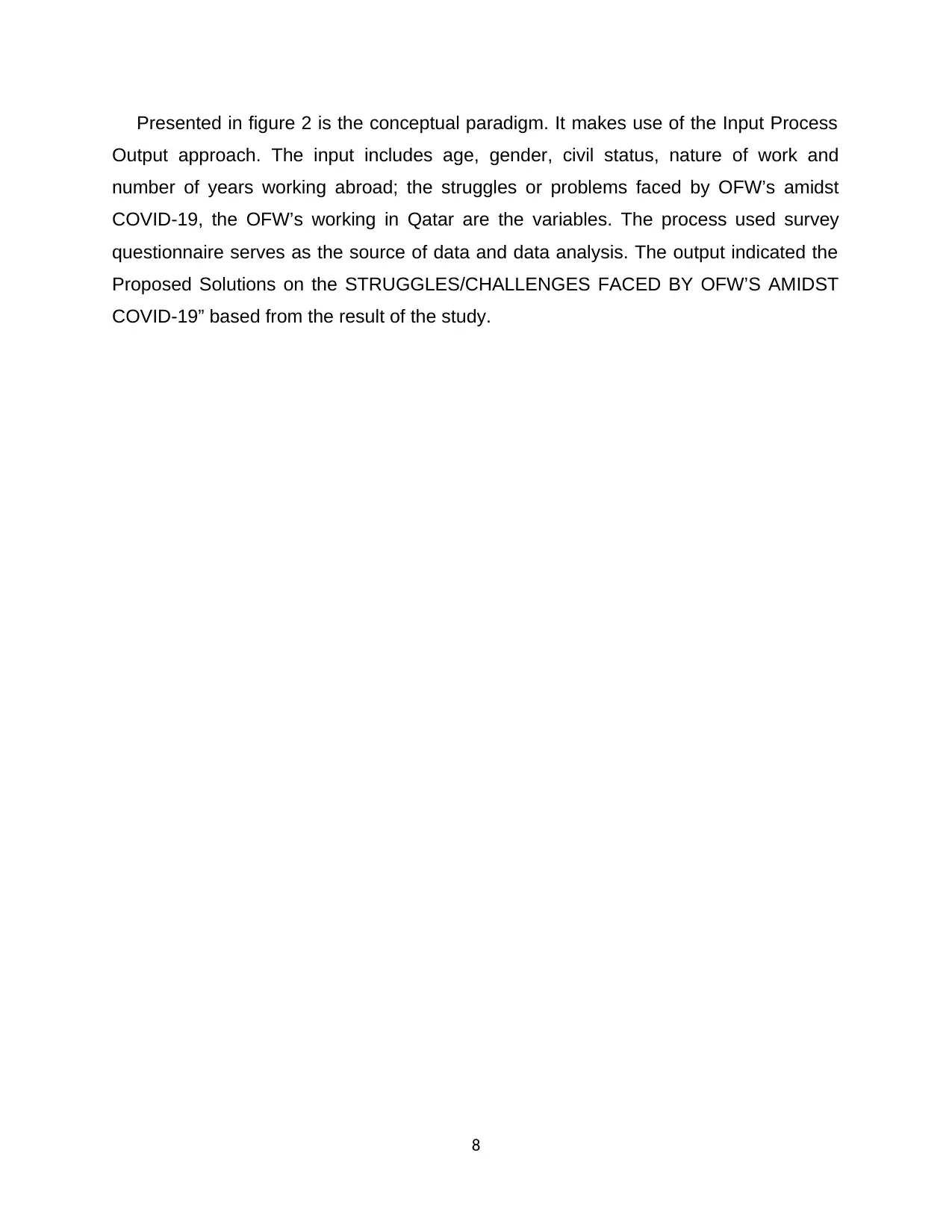
Presented in figure 2 is the conceptual paradigm. It makes use of the Input Process
Output approach. The input includes age, gender, civil status, nature of work and
number of years working abroad; the struggles or problems faced by OFW’s amidst
COVID-19, the OFW’s working in Qatar are the variables. The process used survey
questionnaire serves as the source of data and data analysis. The output indicated the
Proposed Solutions on the STRUGGLES/CHALLENGES FACED BY OFW’S AMIDST
COVID-19” based from the result of the study.
8
Output approach. The input includes age, gender, civil status, nature of work and
number of years working abroad; the struggles or problems faced by OFW’s amidst
COVID-19, the OFW’s working in Qatar are the variables. The process used survey
questionnaire serves as the source of data and data analysis. The output indicated the
Proposed Solutions on the STRUGGLES/CHALLENGES FACED BY OFW’S AMIDST
COVID-19” based from the result of the study.
8
1 out of 8
Your All-in-One AI-Powered Toolkit for Academic Success.
+13062052269
info@desklib.com
Available 24*7 on WhatsApp / Email
![[object Object]](/_next/static/media/star-bottom.7253800d.svg)
Unlock your academic potential
© 2024 | Zucol Services PVT LTD | All rights reserved.

